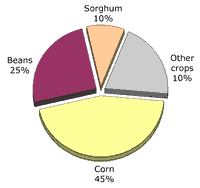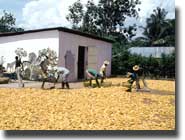Improved seed production.
Currently the majority of farmers are planting food grains bought in the market and crop yields are at subsistence levels. Improved seeds, selected for local conditions, offer farmers a better chance to harvest lucrative crops. ORE has set up a seed processing facility in Camp Perrin where we can produce approximately three hundred tons of commercial seeds a year, using material from our ongoing seed research and improvement program. The benefits are increased yields, higher income and improved nutrition.
More on improved seeds
Nutritional goals: QPM (quality
protein maize) and iron rich beans
Economic benefits of improved seeds
Training activities for seed production
Support our efforts to improve staple crops in Haiti




